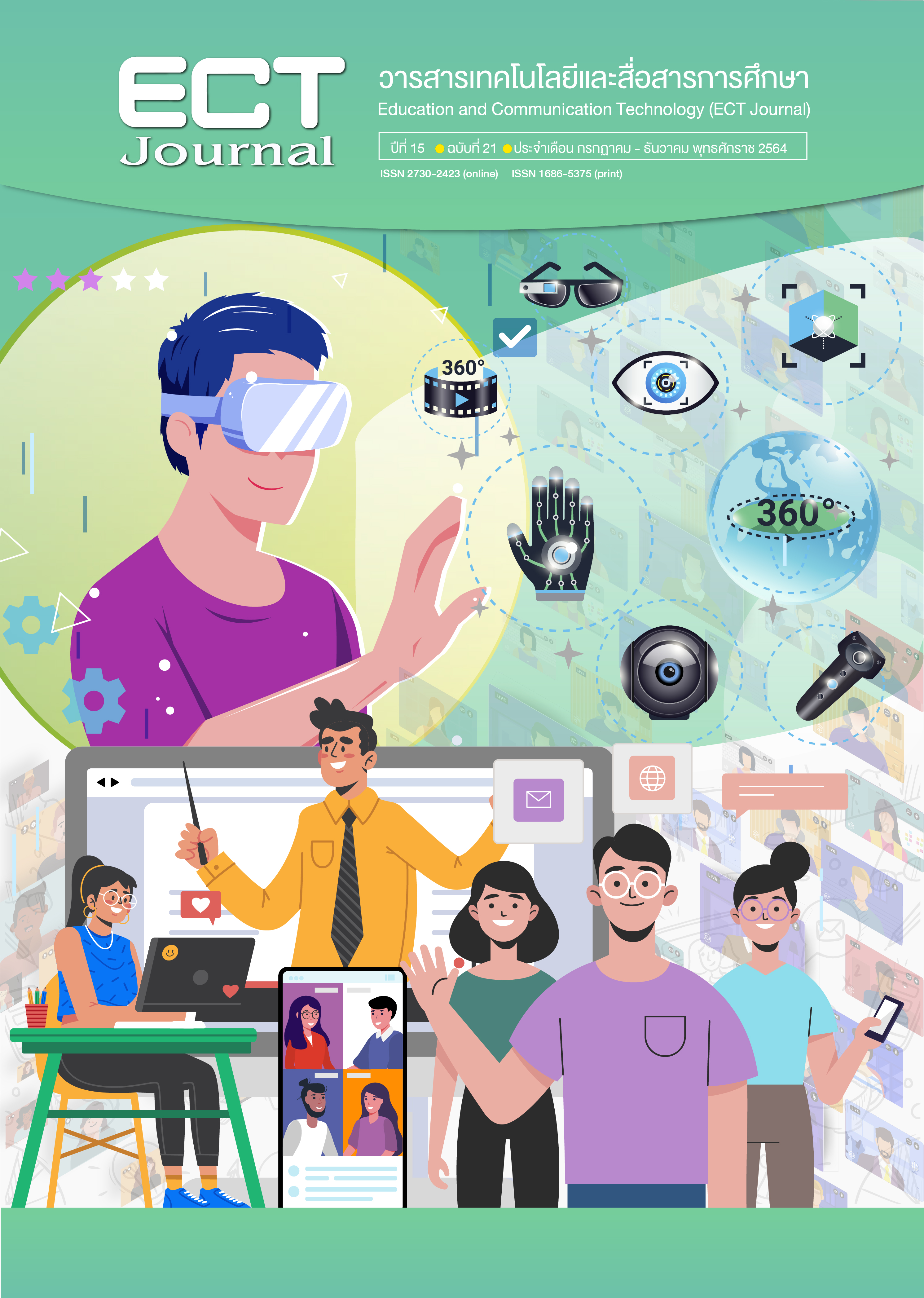The Development of Microlearning Lessons on Social Networks Based on the Constructivist Approach to Promote the Analytical Thinking of Matthayom Sueksa 6 Students
Keywords:
micro-learning lessons, social networking, analytical thinking, the constructivist approachAbstract
In this research investigation, the researcher has the objectives to develop 1) microlearning lessons on social networks based on the constructivist approach to Promote the analytical thinking of Matthayom Sueksa 6 students with a criterion efficiency of 80/80; to compare 2) the analytical thinking prior to and after the study with the constructed microlearning lessons; and to investigate 3) student satisfaction with the constructed microlearning lessons. The sample population consisted of 44 Matthayom Sueksa 6 students at Daruna Ratchaburi School in the mathematics science program using the technique of simple random sampling by drawing lots. The research instruments consisted of (1) microlearning lessons on social networks based on the constructivist approach; (2) an evaluation form of microlearning lessons; (3) an analytical thinking test; and (4) a questionnaire eliciting satisfaction.
Findings showed that 1) The constructed microlearning lessons exhibited a criterion efficiency of 80/80 (81.87/80.89). 2) The analytical thinking scores of the students under investigation after the study with microlearning lessons were higher than those prior to the study at the statistically significant level of .05. 3) The students studying with the constructed microlearning lessons exhibited satisfaction at a very good level (M = 4.51, SD = 0.17).
References
ชัยยงค์ พรหมวงศ์. (2556). การทดสอบประสิทธิภาพสื่อหรือชุดการสอน. วารสารศิลปากรศึกษาศาสตร์วิจัย, 2(1), 7-20. https://so05.tci-thaijo.org/index.php/suedureasearchjournal/article/view/28419
ธีรพร วันพุธ. (2561). ผลการใช้สื่อมัลติมีเดียร่วมกับการเรียนตามแนวคอนสตรัคติวิสต์ เรื่อง ศิลปะการถ่ายภาพ ของนักศึกษาระดับปริญญาตรี. ใน การประชุมวิชาการระดับชาติเพื่อนำเสนอผลงานวิจัยระดับบัณฑิตศึกษา ครั้งที่ 11 (น. 153-163). มหาวิทยาลัยรามคำแหง. http://www.graduate.ru.ac.th/wp-content/uploads/2020/01/บทความทั้งหมด.pdf
บุญชม ศรีสะอาด. (2545). การวิจัยเบื้องต้น (พิมพ์ครั้งที่ 7). สุวีริยาสาส์น.
พิสุทธา อารีราษฎร์. (2551). การพัฒนาซอฟต์แวร์ทางการศึกษา. อภิชาติการพิมพ์.
ลัดดาวัลย์ คงสมบูรณ์. (2562). การพัฒนาไมโครเลิร์นนิงสำหรับนักศึกษาระดับประกาศนียบัตรวิชาชีพชั้นสูง วิทยาลัยอาชีวศึกษาเอกชนในเขตกรุงเทพมหานคร. วารสารวิชาการมหาวิทยาลัยกรุงเทพธนบุรี, 8(2), 51-62. http://www.dpu.ac.th/dpurc/assets/uploads/magazine/g4pv61z32q80o888.pdf
สุระ น้อยสิม. (2560). ผลของสิ่งแวดล้อมทางการเรียนรู้บนเครือข่ายตามแนวคอนสตรัคติวิสต์ที่ส่งเสริมการคิดวิเคราะห์การเขียนโปรแกรมด้วยภาษาซี เรื่อง คำสั่งควบคุม สำหรับนักเรียนชั้นมัธยมศึกษาปีที่ 5. วารสารบัณฑิตศึกษา, 17(77), 50-61. https://so01.tci-thaijo.org/index.php/SNGSJ/article/view/171583
Anand, S., & Timothy, A. (2016). Technology enabled learning excellence essentials. HR.com.
Chaijaroen, S. (2008). Education technology: Principles theories to practices. Khon Kaen University.
Likert, R. (1932). A technique for the measurement of attitudes. Archives of Psychology, 22(140), 1-55. https://legacy.psycharchives.org/jspui/bitstream/20.500.12034/2731/1/40803.pdf
Downloads
Published
How to Cite
Issue
Section
License
Copyright (c) 2021 มหาวิทยาลัยสุโขทัยธรรมาธิราช

This work is licensed under a Creative Commons Attribution-NonCommercial-NoDerivatives 4.0 International License.
1. ทรรศนะและข้อคิดเห็นใด ๆ ที่ปรากฏอยู่ในวารสาร ECT Education and Communication Technology Journal เป็นของผู้เขียนโดยเฉพาะ สำนักเทคโนโลยีการศึกษา มหาวิทยาลัยสุโขทัยธรรมาธิราช และกองบรรณาธิการไม่จำเป็นต้องเห็นพ้องด้วย
2. กองบรรณาธิการของสงวนลิขสิทธิ์ในการบรรณาธิการข้อเขียนทุกชิ้น เพื่อความเหมาะสมในการจัดพิมพ์เผยแพร่






